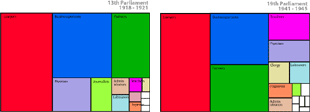Apparently, when the going gets tough, Canadians turn to lawyers. I have semi-arbitrarily qualified the two world wars as national crises (yes, we could argue over what other crises may well have faced the nation, but for sake of simple conjecture I will use these), and examined what occupations emerge amongst our elected representatives. During both world wars, members of the legal profession end up as the dominant non-Parliamentary career in the House of Commons. There is only one other point at which they are the dominant occupational group… During the Depression and the 17th Parliament from 1931-1935:
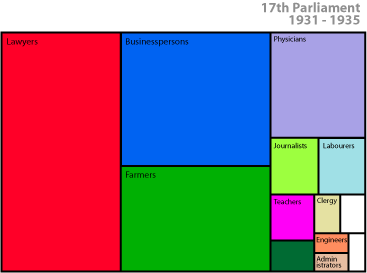
In a previous post, I challenged my own belief that lawyers formed the largest group in Canadian parliament. Looking at current composition I was somewhat surprised to discover that businessperson and administrators make up the bulk of MPs. I subsequently posited that maybe this was something that had changed over time and followed this study with a look at what occupations were represented amongst the first few sessions of Canadian Parliament. Although lawyers may in fact represent or have represented the dominant members of the house (this might be measured by looking at occupations of ministers of the crown), business interests seem to have been dominant largely throughout the past 160 years.
The exception to this appears to be during wartime. The occupation of members of the Unionist government in the 13th Session (1917-1921) can be proportionally represented:
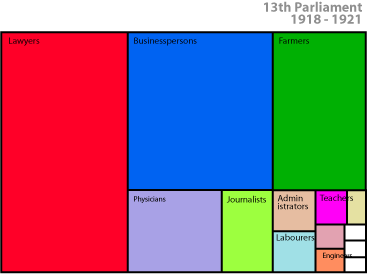
In this session lawyers edged out businessmen and were followed by farmers and by physicians at their highest proportion in any session.
During the Second World War, the 19th Session of Parliament (1941-45) was also dominated again by lawyers: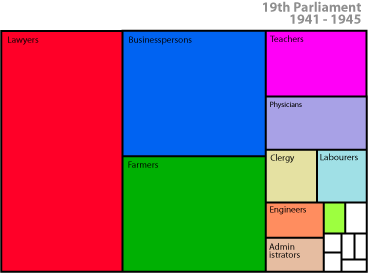
However, teachers and professors show a large increase in voter’s confidence as do members of the clergy.
As a side note. If you happen to be wondering where those lawyers are coming from, its Quebec. They actually come from across the country, but as proportion of elected representatives over half of those from Québec are lawyers. To be fair, 100% of the reps from Yukon are lawyers, but there is only a single member. MPs from Québec during the 17th Parliament are composed of the following occupations:
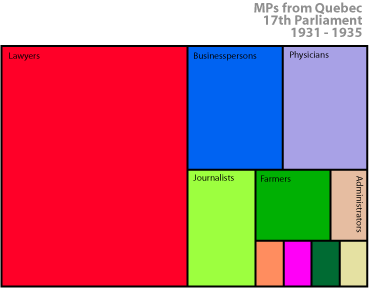
This is a rather simplistic analysis of how Canadians cast votes, but it does raise the interesting question of possibly where citizens place their confidence when faced with national crises and how policy during these crises may be effected by the personal characteristics of those setting policy.
I used the tree chart tool from Many Eyes to create these visualisations.

